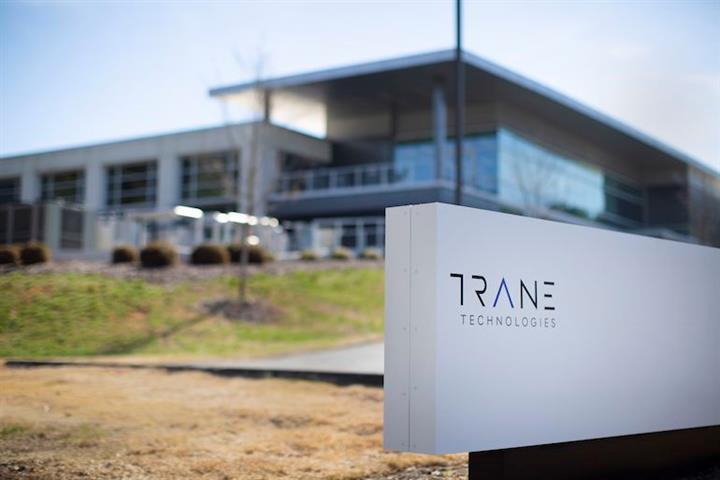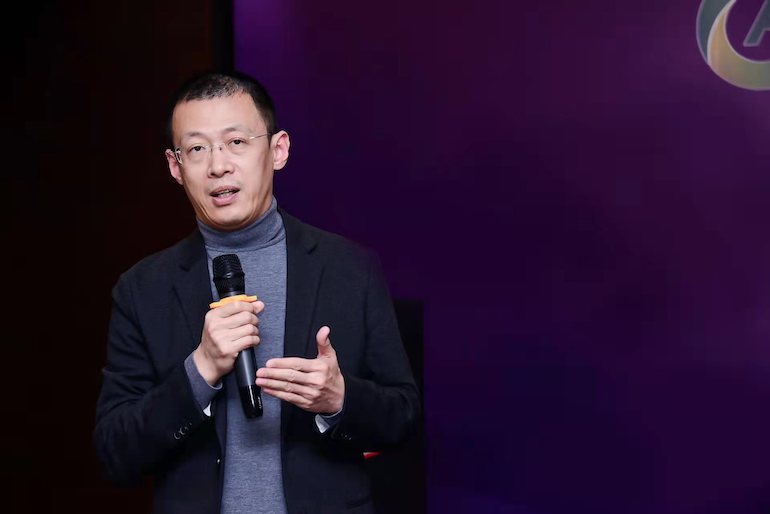 Trane Technologies Enjoys Good Leverage in China Amid Pandemic, Decarbonization Trend, APAC VP Says
Trane Technologies Enjoys Good Leverage in China Amid Pandemic, Decarbonization Trend, APAC VP Says(Yicai Global) Nov. 5 -- Trane Technologies, a global climate innovator in heating, ventilation and air conditioning (HVAC) and transport refrigeration, has good leverage in China as interest in greener and healthier buildings grows after the Covid-19 pandemic broke out and decarbonization was added to the nation’s agenda.
“We’re doing quite well in the Asia-Pacific, especially in China last year,” said Daniel Deng, vice president of corporate affairs and communications, Asia Pacific.
Although the Covid-19 pandemic has brought difficulties to supply chains, it has also brought opportunities to Trane Technologies’ core HVAC business – Trane and its cold-chain logistics provider Thermo King, he said.
In the third quarter, the Asia-Pacific segment of Trane Technologies -- the new name for Ingersoll-Rand’s Trane and Thermo King businesses after it spun off its industrial interests last March -- delivered modest revenue growth and significant bookings growth despite pandemic-related impacts.
Trane Technologies’ bookings in Asia-Pacific jumped 14 percent to USD372.1 million in the third quarter from a year ago, net revenues rose 3 percent, while profit fell 3 percent.
Trane launched disinfection and air purification products, or improved older devices with disinfection functions, and put them in the whole temperature control and air conditioning system. “Customer demand was strong enough to support growth for the whole year,” Deng said.
The coronavirus pandemic has spurred demand for transporting pharmaceutical products including vaccines, which has become a major growth point for Thermo King. For example, Pfizer's vaccines need to be stored in large containers at minus 70 degrees Celsius, a requirement that only Thermo King can achieve globally.
Global Greening

Trane Technologies is also in a good position to take advantage of the green trend. “Environmental protection policies are becoming more and more strict globally,” Deng said. Being more energy efficient and reducing emissions is no longer a matter of competitive advantage, but one of necessity. “If we don’t do it, we will lose competitiveness completely and be forced out of the playground.”
Deng admitted that conventional refrigerants cost less, but they damage the ozone layer. So Trane has come up with more efficient, yet more expensive reagents. “As sales go higher, overall costs fall as a result of economies of scale,” he said. “In addition, some customers also actively or passively request cleaner and greener solutions or technologies to meet their needs.”
The Ireland-based company has set a target to almost halve product emissions by 2030, reducing customers’ carbon emissions by one gigaton by the year 2030 and achieving carbon neutral operations by the same year.
China AI Opportunities
Trane Technologies continues to reinvest in innovation and technology projects in China. As a veteran of multinational firms, Deng said the Chinese market is quite unique, since it is both a manufacturing and innovation power, driving the development of new industries, facilities and technologies.
For example, artificial intelligence, the Internet of things and data centers are being applied to temperature control, which is becoming a new growth point, according to Deng.
Trane uses the IoT to improve its HVAC operations and cold chain logistics. For example, a data center was built to collect information on clients’ air-cons to achieve remote monitoring. Thermo King uses the IoT and AI to monitor operations of facilities and containers, and provide real-time temperature feedback for further analysis.
“This is critical for firms relying heavily on controlled and uncompromised transport through the distribution network.” said Deng. “No matter how valuable the goods are, as long as the temperature falls out of the range, they are doomed.”
From Deng's point of view, China is at the forefront in all aspects, and the demand for drugs, biological biopharmaceuticals and vaccines is huge. Trane Technologies’ acquisition of Farrar Scientific, a firm specializing in ultra-cryogenic control in the biopharmaceutical and other life science industries, will provide much support to this sector in the Chinese market.
So far Trane Technologies has three Chinese production bases: one each in Wujiang, Zhongshan, and Taicang, where its research and development center is also based. The company has operations in 51 cities across the country and more than 3,500 employees.
Editor: Peter Thomas